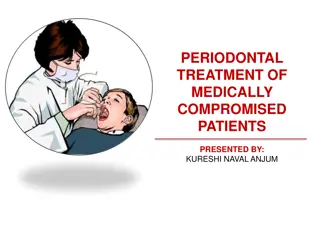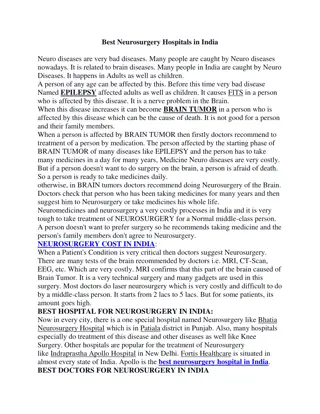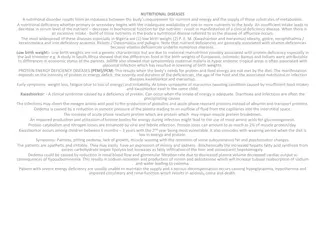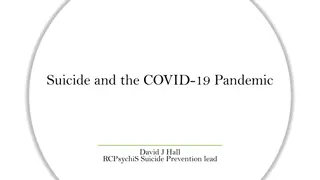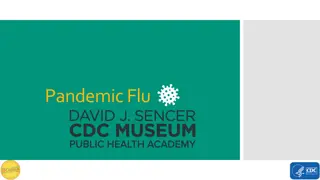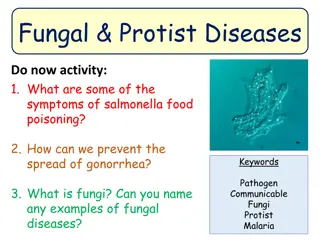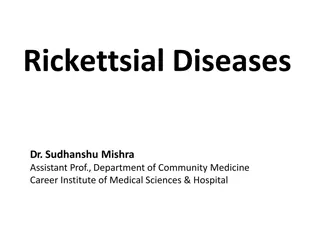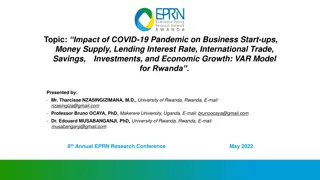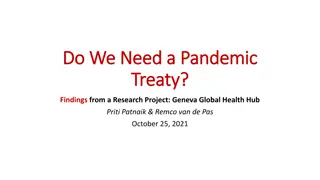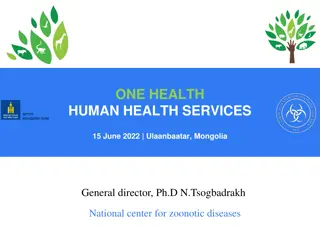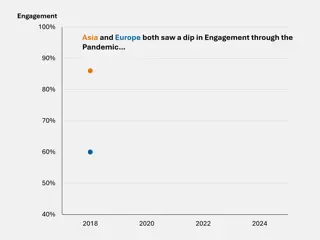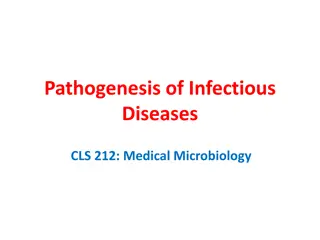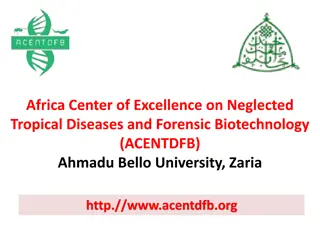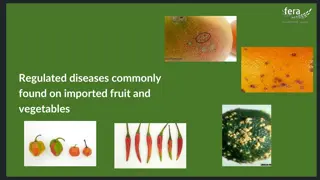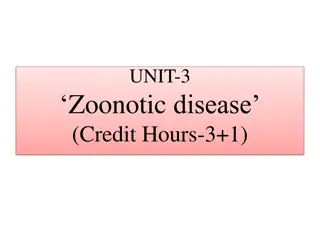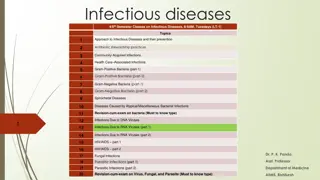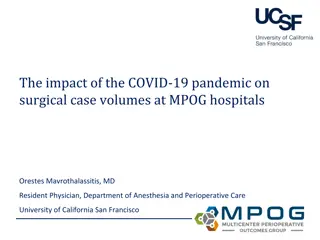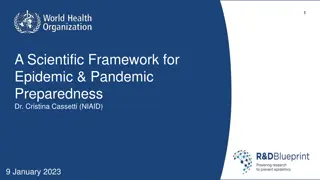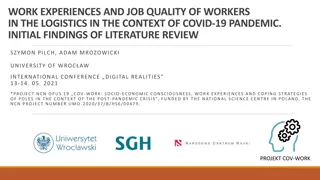IMPACT OF PANDEMIC DISEASES ON RESEARCH AND DEVELOPMENT
Dr. Syed Zaghum Abbas, an Assistant Professor at the Biofuels Institute, Jiangsu University in China, discusses the impact of pandemic diseases on research and development. He explores the challenges faced in the field and provides insights into navigating these obstacles. The article sheds light on how the ongoing global health crisis has influenced the research landscape, particularly in the realm of biofuels. Dr. Abbas delves into the specific ramifications and potential innovations that could arise from this unprecedented situation.
Download Presentation

Please find below an Image/Link to download the presentation.
The content on the website is provided AS IS for your information and personal use only. It may not be sold, licensed, or shared on other websites without obtaining consent from the author.If you encounter any issues during the download, it is possible that the publisher has removed the file from their server.
You are allowed to download the files provided on this website for personal or commercial use, subject to the condition that they are used lawfully. All files are the property of their respective owners.
The content on the website is provided AS IS for your information and personal use only. It may not be sold, licensed, or shared on other websites without obtaining consent from the author.
E N D
Presentation Transcript
IMPACT OF PANDEMIC DISEASES ON RESEARCH AND DEVELOPMENT Dr. Syed Zaghum Abbas Assistant Professor, Biofuels Institute Jiangsu University, Zhenjiang, China
INTRODUCTION Albert Einstein said: "In the middle of difficulty lies opportunity. Today the world is experiencing a pandemic of a novel coronavirus (SARS-CoV-2) of probable zoonotic origin. Healthcare workers and scientists are at the frontline of the battle against the virus, and people around the globe are handling the situation the best they can. However, there is still no sign of decline concerning the morbidity and mortality associated with the novel coronavirus. Besides, this outbreak has created mayhem in the scientific community due to the COVID- 19 intricacies. The scientific community has been experiencing a considerable negative impact from the COVID-19outbreak; Universities, Research centres Laboratories
IMPACT OF COVID-19 ON RESEARCH Universities, research centers, and laboratories are the fertile grounds for the development of new ideas and the expansion of future agenda for the progress of science and scientific communities. Scientific events such as annual meetings of societies, national and international conferences, symposiums, workshops, elective training and clinical observerships. Most scientific events scheduled through September 2020 have been cancelled, and many more have been postponed, few have been able to convert to virtual meetings. such changes will significantly hamper potential scientific innovations and have a tremendous negative impact on the career of researchers and scientists. The cancellation of scheduled annual meetings of scientific societies will delay setting future agenda and policy-making, as well as deferment of entire scientific research processes on a global scale. conferences are converted into virtual conferences, attendance is difficult due to logistical issues; Time zone differences for attendees, internet connectivity issues, inattentiveness of delegates and speakers, accessibility issues
IMPACT OF COVID-19 ON RESEARCH Many researchers, particularly from low and middle-income countries, have lost enormous opportunities for research awards and travel grants for 2020 scientific events. The reduction in scientific events and closure of the scientific workplace result in; Extension of research time Re-starting entire experiments Holding the experiments Downscaling them to a bare minimum All these result in; Add to the economic burden of researchers Adversely affecting their career opportunities psychological stress, anxiety, tension or depression, culminating in reduced scientific output
IMPACT OF COVID-19 ON RESEARCH Beside the effect on earlier carrier of young researchers it also detrimental to academic environment (Schools, colleges and universities) students to wait an undetermined amount of time to begin their careers. Additionally, immediate notification of the cancellation of scheduled university exams and convocations will result in substantial financial impacts due to cancellation of visas, travel tickets, hotel reservations. In USA, Australia and UK hiring is frozen. Dr. Karen Kelsky, recently reported; In USA 400 institution frozen hiring. (Harvard University in Cambridge Massachusetts, Stanford University in California). The University of oxford announced a "recruitment freeze" in April. Conversely, universities in the European Union, where most researchers are supported by funding from the government or external agencies, are not yet in financial crisis and imposed hiring slowdowns. Its very early to predict the impact of COVID-19 on research. May be more damaging and long-lasting than initially envisioned.
IMPACT OF COVID-19 ON RESEARCH New graduates PhDs, Postdoctoral researchers are more vulnerable. Plan b should be in backup for secure the career. Additionally, the majority of international collaborative research, including TB and HIV programs, clinical trials have grounded to a halt for an unknown period of time. Another tangible menace to the scientific community is the redirection of current funding to COVID-19. Dr. Jason Kindrachuk collaborating and working in Kenya. Decrease in budgets due to funding redirection. No-cost extensions for research projects. But few leading research funders like European Union s Horizon 2020 US National Institutes of Health UK Royal Society Australian Research Council Welcome Trust
IMPACT OF COVID-19 ON CLINICAL RESEARCH The COVID-19 pandemic is disrupting clinical research. Many studies that involve face-to-face meetings with participants have been halted completely. At same time this face to face to collecting data can ne possible if social distance maintained. The participants number will not be vulnerable to COVID-19. Music therapy data collection. Data can be collected online or meeting held online. These methods of data collection may be challenged, data me be missing due to following Reasons; Issues of privacy Open answers
IMPACT OF COVID-19 ON DEVELOPMENT The COVID-19 pandemic is far more than a health crisis: it is affecting societies and economies at their core. Vary from country to country. it will most likely increase poverty . Over the next 12 to 18 months, the socio-economic response will be one of one of three critical components. The COVID-19 pandemic is unleashing a human development crisis. Conditions today are equivalent to levels of deprivation last seen in the mid-1980s. 300,000 and indirectly leading potentially to an additional 6,000 child deaths from preventable measure. The pandemic was superimposed on unresolved tensions between people and technology.
IMPACT OF COVID-19 ON DEVELOPMENT The note suggests three principles to shape the response to the crisis: Look at the response through an equity. Focus on people s enhanced capabilities. Follow a coherent multidimensional approach. Unemployment rates in major OECD countries
IMPACT OF COVID-19 ON DEVELOPMENT Major Economic development Between late February and mid-July 2020. Investors have searched for safe-haven investments. Treasury 10-year security, which experienced a historic drop in yield to below 1% on March 3, 2020. Federal reserve lowered key interest rates on March 3, 2020. Bank of Japan engaged in asset purchases to provide short-term liquidity to Japanese banks. The Bank of Canada also lowered its key interest rate. Reflecting investors uncertainties, the Dow Jones Industrial Average (DJIA) lost about one-third of its value between February 14, 2020, and March 23, 2020. Dollar has emerged as the preferred currency by investors.
IMPACT OF COVID-19 ON DEVELOPMENT Pakistan Socio-economic Impact Assessment & Response Plan In Pakistan, pandemic could push millions more into poverty. Real GDP growth is expected to slow by 3 percent. Agriculture will also lag if lockdowns continue and disrupt needed transportation, logistical support, labor, and access to inputs for the next planting season. Those most at-risk include people; Already living below poverty line, Women, children, people with disabilities, The elderly people Other marginalized groups whose lives, livelihoods, nutrition, and access to basic services are least secure.
IMPACT OF COVID-19 ON DEVELOPMENT The UN study recommends a response comprising five work streams: o Making essential health services available to those in need and protecting health systems. o Helping people cope through social protections and ensuring basic services and food security. o Protecting jobs, supporting small- and medium-sized enterprises, and shoring up the most vulnerable workers through economic recovery programs. o Guiding a badly needed surge in fiscal and financial stimuli and strengthening multilateral and regional responses. o Promoting social cohesion and investing in community-led resilience and response systems. At the Government s request, UNDP established a COVID-19 Secretariat in Pakistan. This Framework will inform the government s 2020-2021 budget and national action plan for COVID-19.
CONCLUDING REMARKS Overall, the ongoing global pandemic has been obstructing science communication and will delay scientific research and innovations. Globally, it has taken a grim toll on lives, health services, jobs, and mental health. Nobody is sure how long the coronavirus pandemic will last, creating an unpredictable future. Only option left to adapt and find ways to endure and stay productive. Research students should utilize the present lockdown time wisely. Additionally, scientific communities can contribute to overshadowing falsehoods or misinformation circulating in social media. The next generation of scientists and physicians must be trained for future pandemic preparedness. We should keep investigating, disentangling, and interrogating, only then will science thrive again, and the scientific community will function normally once again.
REFERENCES 1. Li J, Li JJ, Xie X, Cai X, Huang J, Tian X, et al. Game consumption and the 2019 Novel Coronavirus. Lancet Infect Dis. 2020;20(3):275 276. 2. Blancou J, Chomel B, Belotto A, Meslin F. Emerging or re-emerging bacterial zoonoses: factors of emergence, surveillance and control. Veterinary Research 2005;36 (3):507 522. 3. Jonas OB. World Development Report 2014. Background Paper: Pandemic Risk. World Bank. 2014 [cited 2020 May 22]. Available from: https://www.worldbank. org/content/dam/Worldbank/document/HDN/ 4. MIT News. Events postponed or canceled as MIT responds to COVID-19. March 9 2020 [cited 2020 May 23]. Available from: http://news.mit.edu/2020/ events-postponed-canceled-covid-19-0309. 5. Bardelli A. Coronavirus lockdown: What I learnt when I shut my cancer lab in 48 hours. March 19 2020 [cited 2020 May 25]. Available from: https://www.nature. com/articles/d41586-020-00826-7. 6. Drake N. How the Coronavirus is Hampering Science. Scientific American. March 10 2020 [cited 2020 May22]. Available from: https://www.scientificamerican. com/article/how- the-coronavirus-is-hamperingscience/



